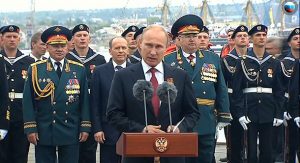Putin’s Russia is “a unique case” in which a country is surviving by paradox, Brookings Institution analyst Lilia Shevtsova says, “converting weakness into strength, tactics into strategy, exceptions into rules, defeats into victory and a civilizational enemy into a resource for survival.”
In an essay in The American Interest
that has now been translated into Russian by Kyiv’s Novoye vremya, she says that the Kremlin while it is still uncertain about what Donald Trump will do is “hoping for the appearance of [still more] new life-saving paradoxes” for itself.
It is possible, she suggests, that Trump will “widen the space for maneuver of the Russian system of personified power; but sooner or later the Americans will begin to create problems for Moscow” because the Russian system is predicated on the West behaving the way it did before Trump rather than in the way it may do so in the future.
“The post-communist Russian system has demonstrated a rare capacity for recovery under conditions of an extended period of decline (yet another paradox),” Shevtsova continues. It has done so by “continuing its own life” by taking advantage of what the liberal civilization of the West has offered.
The post-modern world with its “eclectic relativism, double standards, the collapsing borders between law and illegality, truth and lies, peace and war, principles and pragmatism,” Shevtsova says, “is the ideal milieu for the flourishing of such a system as the Russian one today.”
It allows Putin’s Russia to be at one and the same time a partner of Western governments, a participant inside Western countries, and an enemy of the West both internationally and by blocking Western influence on Russian society. Because Putin is “more post-modern” than any Western leader, he had remarkable success until the Crimean Anschluss
.
After 2004, Moscow became ever more assertive but this “didn’t change anything” because “the Western community as before wanted to see in Moscow a partner rather than an enemy, hoping that cooperation would neutralize” what Putin was saying and doing – “even after Putin’s 2007 Munich speech.”
“The West was forced to react (although unwillingly) and apply the tactic of containment. Russia in response began its anti-Western mobilization,” Shevtsova says. The arrangements that had worked so well for Moscow “came to an end” because the Russian regime felt it had no choice but to challenge them and had a good chance to succeed anyway.

On the one hand, she writes, “the Kremlin couldn’t allow Ukraine to run to the West because this would undermine its status as a great power and would be viewed as a manifestation of weakness.” And on the other, “the Kremlin sought to avoid a confrontation with the West” even then.
Had it limited its actions to the seizure of Crimea, Shevtsova says, Moscow might very well have gotten its way. But its launch of the war in the Donbas made that Russian victory impossible and opened the way to a world which Moscow didn’t want and had no good way to survive in.
“Russia wasn’t prepared for a new Cold War or for a multi-polar world order, despite the Kremlin calling for if. The Russian political class, used to the benefits of globalization and consumerism in the Western manner, did not want that the world, in the absence of American primacy, would move toward a Darwinian struggle for survival.”
“The events of 2015-2016 showed that the Kremlin, as before, is passionately trying to resume a dialogue with America,” Shevtsova says, “although on this occasion, it is seeking to occupy a more significant place at the table.” Trump, whose election Putin supported, seems quite prepared to allow that.
And if that happens, it will represent yet another paradox, albeit one that the Brookings analyst does not mention in this essay.
Related:
- Putin, like Trump, being pressed to take harder line abroad to shore up his own position, Piontkovsky says
- "Kremlin views Trump as 'stupid, un-strategic, and manipulable,'" and other neglected Russian stories
- 'There are no liberals in Putin's Kremlin,' Barbashin and Inozemtsev say
- Why the arrest of Firtash may mean the death of the Russian mafia
- 'Enemy of the people' is a Russian -- not an American -- term






